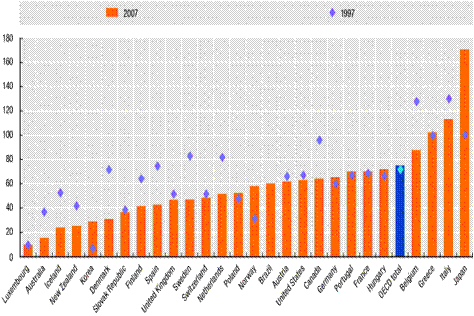 OECD Government debt as % of GDP
OECD Government debt as % of GDPAs Europe is roiled by sovereign debt fears, it’s important to realize that the crisis in the largest of the PIIGS (Portugal, Ireland, Italy, Greece, Spain) has nothing to do with fiscal irresponsibility. On the even of the crisis, Spain was running a budget surplus; its debts, as you can see in the figure above, were low relative to GDP.
So what happened? Spain is an object lesson in the problems of having monetary union without fiscal and labor market integration. First, there was a huge boom in Spain, largely driven by a housing bubble — and financed by capital outflows from Germany. This boom pulled up Spanish wages. Then the bubble burst, leaving Spanish labor overpriced relative to Germany and France, and precipitating a surge in unemployment. It also led to large Spanish budget deficits, mainly because of collapsing revenue but also due to efforts to limit the rise in unemployment.
If Spain had its own currency, this would be a good time to devalue; but it doesn’t.
On the other hand, if Spain were like Florida, its problems wouldn’t be as severe. The budget deficit wouldn’t be as large, because social insurance payments would be coming from Brussels, just as Social Security and Medicare come from Washington. And there would be a safety valve for unemployment, as many workers would migrate to regions with better prospects. (Wages wouldn’t have gone up as much in the first place, because of in-migration).
The point is that this has nothing to do with a spendthrift government; what’s happening to Spain reflects the inherent problems with the euro, which now more than ever looks like a monetary union too far.

